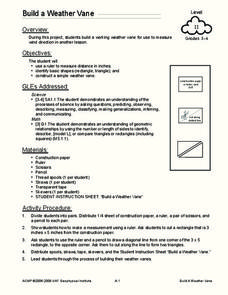Curated OER
Build a Weather Vane
Third graders measure wind direction. In this weather activity, 3rd graders build a weather vane from a straw, skewer, spool, and flag. Students measure wind direction using their weather vane.
Curated OER
Wind
Students conduct an experiment. In this wind measurement lesson, students learn about instruments that measure the wind and then make a weather vane. Students record wind speed over a few days.
Curated OER
Weather Tools of the Trade
Fourth graders study the basic meteorological instruments (thermometer, barometer, weather vane, anemometer, and rain gauge). They explore how they are used, data that can be collected from them, and why records of the data are kept.
Curated OER
Wind speed at different locations
In this wind speed worksheet, students walk around the school with a weather vane or wind sock and record the speed of wind in different places. Students fill in a chart and write one conclusion.
Curated OER
Finding Wind Direction
Students identify the wind direction. In this weather lesson, students use a weather vane to find the wind direction. Students complete a worksheet.
Curated OER
The Air Out There
Students build windmills and weather vanes. In this lesson on air, students build wind vanes and windmills to demonstrate that air moves. Students determine the direction of air movement and measure the speed at which it is moving.
Curated OER
Meteorology Madness
Students probe the dynamic weather changes through several hands-0n activities in this seven lessons unit. The hydrologic cycle, clouds, atmosphere, air movement, fronts, and forecasting form the components presented in this unit.
Curated OER
Weather Watchers
Students engage in this weather predicting lesson. They discover instrumentation used in the meteorological science. With this knowledge, they will create their own "low-tech" versions of weather instrumentation such as thermometers,...
NOAA
Noaa: Build Your Own Weather Station [Pdf]
Build six different instruments to collect meteorological data for the weather in your area.
TeachEngineering
Teach Engineering: Wild Wind
Students will learn the difference between global, prevailing and local winds. In this activity, students will make a wind vane out of paper, a straw and a soda bottle and use it to measure wind direction over time. Finally, they will...
Center for Innovation in Engineering and Science Education, Stevens Institute of Technology
Ciese Real Time Data Projects: Building and Using Weather Instruments
In this lesson students will build and learn how to use three weather. They will use these instruments to collect weather data over a period of two weeks.
Utah Education Network
Uen: Weather Tools of the Trade
Learn all about the basic meteorological instruments.
eSchool Today
E School Today: Your Cool Facts and Tips on Wind
Learn all about wind, what it is, words used to describe wind, the different types, the coriolis effect, different types of breezes, and how wind is measured.
American Museum of Natural History
American Museum of Natural History: O Logy: Stuff to Do: Make a Weather Station
Make a wind vane, rain gauge, and barometer and learn how to measure wind direction, rainfall, and air pressure.
Science Struck
Science Struck: How to Make a Wind Vane in 5 Easy Steps
Explains how to make and install a weather vane using simple materials. Includes illustrations.
The Franklin Institute
Franklin Institute Online: Make Your Own Weather Vane
As part of a unit on gathering data about the weather, this lesson features instructions for making a simple weather vane.
The Franklin Institute
Franklin Institute: Make Your Own Weather Station
This page, provided by the Franklin Institute, shows you how to become an amateur meteorologist. Directions on how to construct a weather station include the barometer, hygrometer, rain gauge, weather vane, and compass.
Mocomi & Anibrain Digital Technologies
Mocomi: What Is a Wind Vane?
Explores wind vanes, how they work, where they are found, and other interesting facts.
Curated OER
Science Kids: Science Images: Weather Vane
A weather vane can be seen on top of a house roof. It shows the letters N, S, E, W which represent north, south, east and west. It is used for wind direction.










![Noaa: Build Your Own Weather Station [Pdf] Activity Noaa: Build Your Own Weather Station [Pdf] Activity](https://d15y2dacu3jp90.cloudfront.net/images/attachment_defaults/resource/large/FPO-knovation.png)



